Parkside Memories, 1959 to 1989
The Pipework Incident
We arrived at work one morning to find that a major incident had taken place. Over the last few months, a new 10" c/a pipe had been in the process of being installed in No 1 shaft, this being suspended from the shaft side by means of chains, welded to stainless steel plugs, bonded into holes with resin. The work had been carried out by the shaft team and engineers, and Mick Hibbert, the colliery engineer was responsible for the job as a whole.
Ken Leach, the deputy manager rang me in the stores. " Fred, get all the sweeping brushes and shovels you can lay your hands on, and find as many paint brushes that you can as well!!" That was the first inkling that I had of the disaster that had happened. Apparently the whole range of some 160 pipes had somehow broken loose from the shaft side, and plunged to the bottom, wrecking landing gear and canopies at the various horizons on the way. A couple of shaftsmen had been trapped in the cage and the emergency winder had been brought in to rescue them. As there was now only one access to the mine via No2 shaft, only a limited number of men could, by law, be underground at one time. I think that the limit was 30.
The rest of the personnel had to be found work sweeping, cleaning up, repainting, in fact anything to keep them employed. We set the wheels in motion and soon there were supplies of paint and brushes on their way from central stores all over the country. There were more than enough of these purloined and taken home! It was impossible to keep a check on them, as men only had to come into the stores and report that someone had taken their brushes, to get some more.
This situation lasted for at least a couple of weeks while all the stops were pulled out to get the shaft up and running again. All the 10" range that had collapsed was cut up and stowed in the North tunnel at No3 horizon where the side of the roadway was completely filled with them for a distance of some 200 yards. Mick Hibbert, the engineer was demoted and sent back to Area at Stoke-on-Trent, and Bill Gaskell appointed in his place.
At the time, it was touch and go as to whether Parkside was to be written off or not.
It was decided sometime in 1987 to strengthen the winding tower over No2 shaft. This was to allow for the boost to the fans, which were housed there. The fans were to be speeded up to give a better airflow underground because of the amount of roadways that had to be ventilated. At one time, the surveyor told me that there was approximately 35miles of tunnels underground to be ventilated. I never saw the final account for the job, but it must have cost at least a million. The contractors were there for at least a year, fixing steel to the side of the tower and then making concrete buttresses. I don't know what the final cost was but it was another "White Elephant" and completely unnecessary, because the fans were never stepped up. Instead, a parallel intake was driven from the pit bottom to deliver ventilation to the Wigan Mines Access. This was driven by the ATC, using Shelton arches, and kept on line by means of a laser. We had to identify these arches on the surface, using a plan given to us by the firm. The junction with the south tunnel was made from these arches, and to allow for the split in the roadway, varying sizes of crowns were used. The only way to identify them, I recall, was to measure the distance between the holes for the struts. Each different crown had a unique distance between the holes, so woe betide if the wrong crown was sent down.
In 1987, Kirkless stores closed down and then all supplies had to come from Trentham, near Stoke-on-Trent. The transport system was privatized and consequently all journeys made by the hauliers had to be paid for by each individual colliery unit.
One engineer got himself into trouble on the back shift by sending out for a 4p washer for a job. The total cost of transport for it was £200.00!!!
I used to go underground every day at the start of the shift to check on supplies. This way, there was no comeback from the underofficials, because, make no mistake, all of them had one thing in mind, Look after No1. All the supplies when sent underground found their way into the run round between the North and South tunnels, and it was here that I would go, book in hand, checking them off. It was a very useful exercise, because I would be accused of not having sent something and, when I investigated, would turn it up amongst the supplies.
This brings me to the tale of Mick Morton. Mick was Overman in charge of one of the districts, and he rang me in the office one day to complain that I hadn't sent him something or other. I told him that I had and he started to slag me off and call me a liar on the phone. At this, I put the phone down on him. When he rang back he was blazing!! "Don't you ever put the phone down on me!!" he said. I said to him "When I tell you something, it is the truth, because I don't need to lie, so if you call me a liar again, the phone will go down" It did him a bit of good because he never tried it again!!
One Monday, a message had been left for me to see Frank Reid before I went underground, and of course I got all the usual remarks from the various overmen and undermanagers. They thought that I was due to a kicking. Apparently, I had sent a roll of belt underground on the previous Friday and it was the wrong type. When I saw Frank Reid, I explained what had happened and told him that I had rectified the mistake as soon as I could. The explanation was accepted and he told me then to watch my back as there were a lot of backstabbers about. No doubt someone was trying to stir up trouble for me.
Just before I left the industry in 1989, I had been offered the job of Assistant Storekeeper, but I turned it down as the pay wasn't as good as the pay that I was getting. As it was, I was more or less doing the job in conjunction with my own. When John Rogers finished as Storekeeper in December 1988, Jimmy Robinson took the job, and he had been at Golborne, just as Keith Dooney, who was to take my job, had been. When Jimmy came into the stores, he had a clean sweep and imported a load of new files and desks, but as Manners do not make man, neither did new equipment make a good storekeeper!! Jimmy was OK, but a bit "slapdash" when it came to ordering. He would tell me to let him know when I wanted anything, but it all came down to one thing, and that was for me to do it myself.
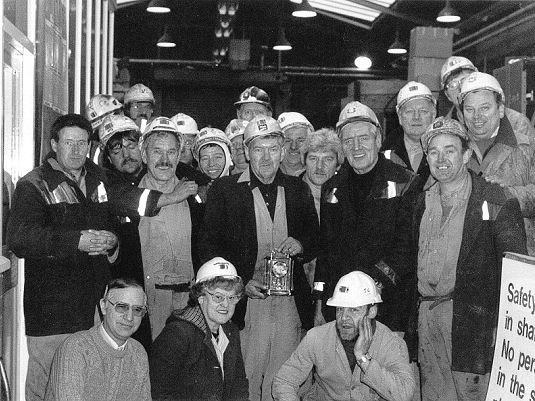
Presentation of clock to Harry Burns on his retirement.
After Harry Burns had finished work just after the strike, Karl Singleton came into the stores as an assistant to John Croston, acting as issuer of materials. We had as an office cleaner, a lady called Hellen, who would come in each morning and clean up in the office for us. Anyway, Hellen finished and a new lady came, I don't recall her name, but it doesn't matter. This lady and her husband were committed Pentecostals and she was full of the evangelizing spirit. After she had completed cleaning the office, John would make a brew and she would sit down and chat with them. The upshot of it was that Karl decided to become a Pentecostal and attended their meetings. He was baptized, and thought that he could speak with "tongues".
When the job of assistant storekeeper came up for grabs, Karl was supremely confident that he would get it. He said that he had prayed about it and thought that he would walk it, but he never got as far as an interview.
He had been in the Territorials at one time and had suffered head injuries, leaving him with epilepsy, for which he was being paid a pension. When he "found God" as it were, he pronounced himself cured and sent his pension book back to the Defence Ministry. His dad, Kevin, who was Fire Officer at the pit, went berserk, but couldn't do anything about it!!
Whenever Karl got into an argument with anyone over his beliefs, he would get out of it by saying, "If it's not scriptural I don't want to know" As I said, he went the whole hog, even to giving the church a tenth of his earnings. He finally departed the scene for London to work with the down and outs, and I lost contact with him. He lived for a spell in Abram and John Rogers told me that he had religious banners all over his windows.
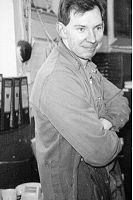
Karl Singleton.
We had, as overall supremo, in place of Winston Hodgkinson, the Surface Superintendent, a man from the Opencast Executive, by the name of Dennis, and he got off on the wrong footing right away with Frank Reid, because one day, Dennis went off with a rep. for "a spot of lunch" to a nearby pub. When Frank got to know about it he said "If I can't leave the colliery during shift time, then neither does he!!"
I could have had a lot of free lunches, but then again, I couldn't spare the time from the job. We managed one or two of course because the reps would meet us after work and we would go sometimes to the pub in Newton High St. The Bulls Head, or again to the Travellers Rest at Lowton. The job did have its perks.
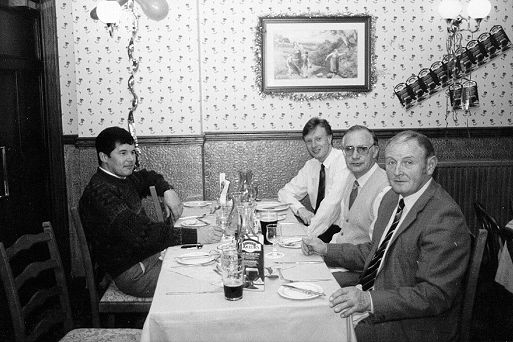
Meal out in Lowton.
Of course, when Christmastime came around, there was always the circular from Staffs House telling us not to accept any "trade gifts" that could be misconstrued as bribes, and that we were only to accept stuff like pens and diaries, which were emblazoned with a trade name. I think that this was a matter of "Don't do as I do, do as I say" Everyone ignored the circular and all the booze, diaries, and any other stuff was usually pooled and shared amongst the stores staff. I made a point of asking reps for bottles of wine, as I didn't care for whisky, and consequently received several bottles of Blue Nun, Piesporter, etc. which were stashed in the car to be taken home.
On one occasion, we had given Stan Stock, the haulage contractor an order for 5,000 tonnes of broken stone to lay the foundation for the new coal stocking ground, and Stan himself called round to see us in the stores. He had with him a full case of Bells whisky, and he told us to distribute it amongst ourselves as a thank you for the order!! If we got then what did the ones higher up in the pecking order get?
I had a very good rapport with Ken Leach, who was deputy manager until just before I finally finished work, when he moved to Silverdale drift in the Midlands. He was a real character and had a swimming pool at the house where he moved to when he left Burnley in 1984. The house was in Lymm and he got in with the rep from Grace Dearborn the chemical firm who supplied us with various components mainly for the washery. The rep would fix Ken up with chemicals for his pool maintenance, all gratis of course. He was completely different from Bert Dyer, who would never leave himself open to any chance of scandal. When Bert's wife was in hospital, he would go to the payphone to ring up, rather than use the one in his office. On another occasion, the drains at Bert's house were blocked, so he asked for some men to go with the rods and free it for him. When they had done so, he got the time office to stop the time that it had taken for them to do the work, and he paid them out of his own pocket.
The reason for all this came apparent when Bert told of a manager in Yorkshire being dismissed because it came to light that he had used NCB materials and labour to refurbish his kitchen.
Ken used to leave himself wide open sometimes. Once, he had me and the engineer loading the roof rack of his car with timber that the joiners had sawn for him. He was doing some decorating at home and wanted some planks to stand on. Mick Hibbert, the engineer, said to me " I can't believe that I am doing this, the Colliery Engineer helping the Deputy Manager to steal timber!!"
On other occasions he would say to me, "go and get me a couple of bags of coal, my dad's run out of fuel, here are the keys to the car, put it in the boot for me."
We has a chain saw in the stores and when Ken got to know about it, he borrowed it on numerous occasions, and as others found out about it, they wanted to borrow it as well. He couldn't really say no, and the consequence was that the saw was lent out and never came back. We had our suspicions as to who had it but we couldn't prove it.
There was a lot of thieving went on at the pit. Oil lamps were disappearing at a rate of knots because someone had found that they could get £15.00 each for them. If a deputy put his lamp down, it would be gone in no time. A favourite way of lifting them was to have a 2-pint flask without middle and place the lamp in this to get it home.
The NUM had struck a deal with the NCB that tools would be provided free of charge, and this meant that fitters were forever being robbed, tool boxes broken into, and tools disappearing on to car boots and markets. We had a lock up in the stores where tools were kept and even that got broken into on backshifts. We must have gone through hundreds of adjustable spanners, Stanley knives etc. Always the same tale "someone's lifted it".
In the days when Stone's was working, handpick blades were sharpened in the blacksmith's shop, hammers were re-shafted by the joiners, and chisels were sharpened. The Health and Safety at Work Act changed all that. No one would take the responsibility of the consequences of anyone getting hurt after sharpening and repairing, so if something needed attention, it went in the bin and another was got from the stores. Talk about waste of resources!!
When I finally got my "Marching Orders" so to speak, I didn't have time to bring home anything of use, such as nails, screws, and nuts and bolts. I was told on the Friday to be ready to go on the following Monday, it was so short notice. The lads on the yard and workshops had a whip round for me and bought me a Bosch jigsaw and a tripod for the camera. I brought some cans in for them, took some pictures and video, and that was that. My working life at an end. Little did I know at the time that the whole complex would be gone completely in the next four years.
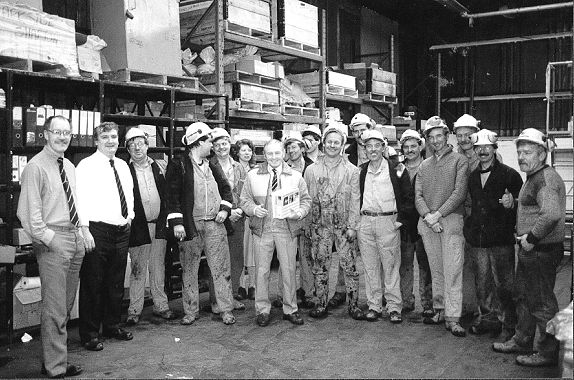
This is me on my last day at work with all the lads off the yard.
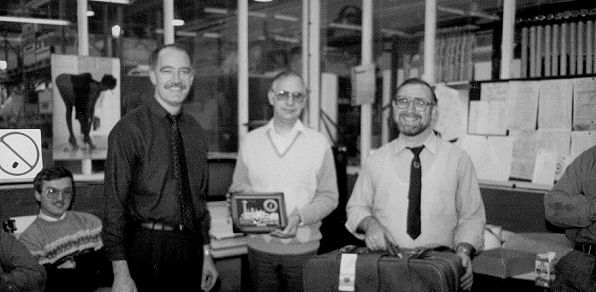
Dennis, Jeff Cook, John Rogers at John and Jeff's retirement presentation.